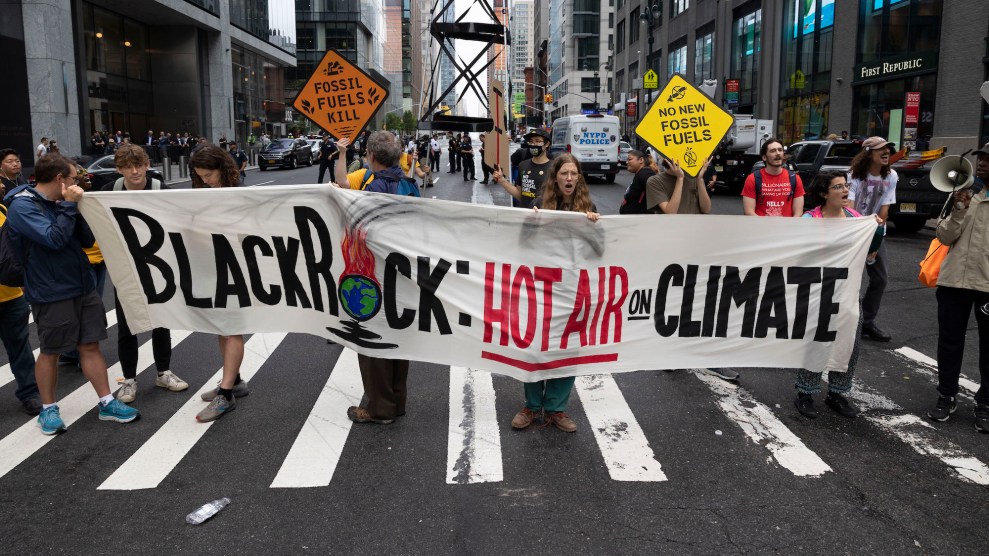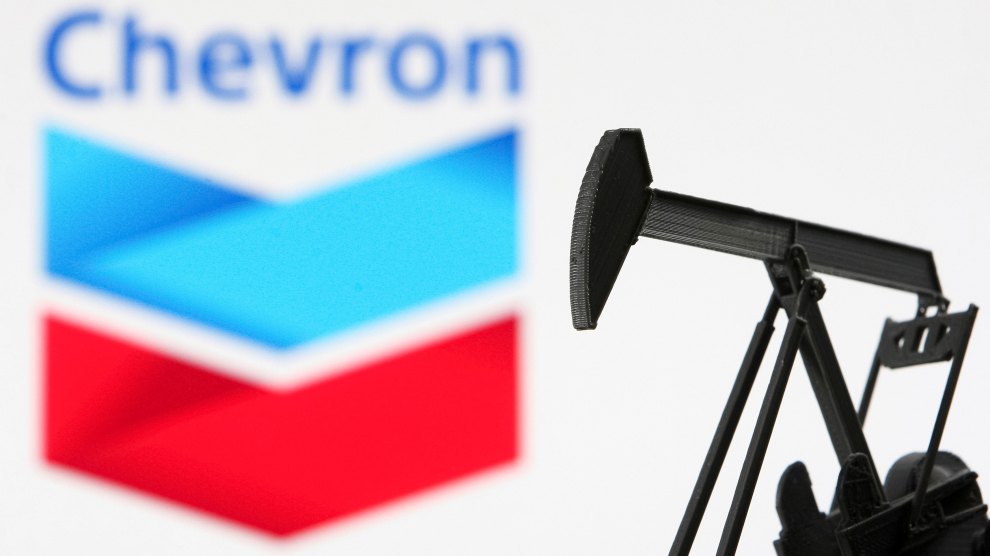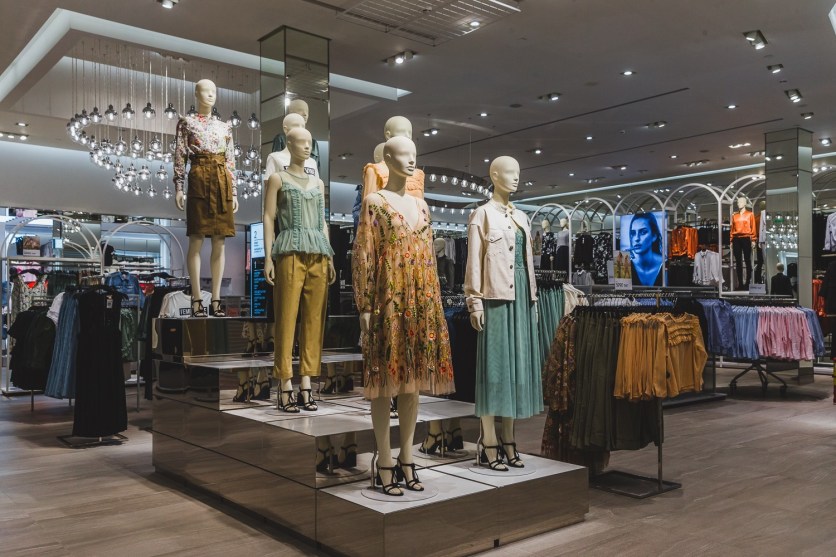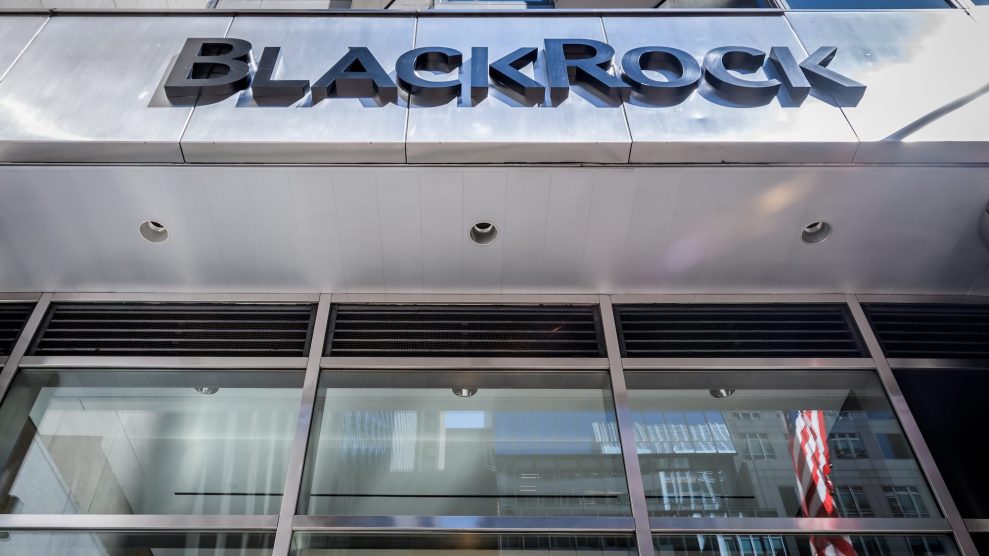
A September 2023 protest outside of BlackRock HQ in New York City.Gina M Randazzo/Zuma
This story was originally published by Inside Climate News and is reproduced here as part of the Climate Desk collaboration.
For years, eagle-eyed environmentalists have called out banks and consumer businesses—from Barclays to fashion brand ASOS—for making misleading claims that their practices or products are sustainable, otherwise known as greenwashing.
However, lately there has been an uptick in “greenhushing,” a seemingly counterintuitive practice in which companies intentionally don’t publicize their climate-friendly actions and goals.
For example, investment firm BlackRock has removed several references to its commitment of helping reach net zero emissions by 2050 from its website, though its CEO said the firm would continue to discuss climate issues with the companies it invests in, reports the Washington Post. Consumer goods companies, including those that sell food and beverages or clothes, are also hopping on the “greenhushing” bandwagon, despite taking steps toward sustainability, reports Grist.
At the same time, public demand for environmentally friendly goods and services has surged in the past few years as the fight against climate change has ramped up. So what’s behind this paradox? Experts say there could be a few factors at play.
In the past few years, liberal activists and organizations have sued companies for rampant greenwashing campaigns, including H&M, Nike, Allbirds shoes and apparel company Canada Goose. Though many of these companies won their suits, they still suffered copious amounts of bad PR.
On the other side of the aisle, right-wing politicians and thought leaders are speaking out against “woke” eco-campaigns and business decisions made with climate change in mind, reports the Post.
“If you’re a CEO who has all the right intentions, you might get sued from both sides—from the left and from the right,” Renat Heuberger, the co-founder and CEO of South Pole, a climate consultancy that released a survey on greenhushing trends, told the Post. “And that is not good news if you want to convince more CEOs to get active on climate.”
In the face of this criticism, some companies have simply stopped publicly speaking about the steps they are taking to curb emissions or reduce their environmental footprints, according to South Pole’s report.
On Monday, Uber launched a new feature that gives riders insight into how many emissions they could avoid by choosing electric vehicle or hybrid options, Axios reports. This is part of a growing trend in the consumer space; just this week, I was searching for a flight on Skyscanner and the app offered information about which options emit the lowest amount of CO2.
Even though these features are increasingly available, do people actually use them when making their final purchase? I asked Xavier Font, a professor of sustainability marketing at University of Surrey who advises companies like Booking, Google, Expedia and Skyscanner.
“At the moment, nobody has done a study—including the companies themselves—that is publicly available that says, ‘does this have an impact or not?’” he told me over the phone. “The thing is, we don’t really know what difference they make. And when companies like these go to great lengths to create a system, I think we could do better testing.”
In a similar vein, research shows that consumers’ behaviors when presented with “eco-friendly” products can be mixed. In a 2022 survey, 78 percent of US consumers responded that a sustainable lifestyle is important to them and 30 percent of them would be more likely to buy products with sustainable advertising.
However, some experiments show that the opposite can happen, as well. For example, in a 2020 study, researchers asked more than 250 Americans their thoughts on two ads for laundry detergent: one with a label stating that it is sustainable, and another without this language. In this case, the majority of participants perceived the more sustainable product to be less effective, without even trying it.
“The labeling of products as sustainable raises skepticism, raises perceptions of information overload [and] raises perceptions of potential greenwashing,” Font says.
To combat this, companies can tap into social influence to get people to buy with sustainability in mind, or focus on other positive attributes of the product, such as innovation and safety, writes Katherine White, a sustainable business researcher at University of British Columbia, and co-authors in the Harvard Business Review.
Overall, there are some risks to greenhushing. As banks and consumer retailers downplay or eliminate their public sustainability pledges, progress can become harder to track, some experts say.
“We really, really, really need a lot more disclosure of all the environmental actions that companies are taking, and we need it to be disclosed regularly and transparently, and we need it to be disclosed quantitatively,” Austin Whitman, the CEO of Climate Neutral, a nonprofit that monitors climate pledges, told Grist.















